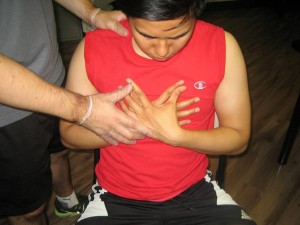Acute coronary syndrome is a condition triggered by abrupt and diminished flow of blood to the heart. Generally, other conditions the same as acute coronary syndrome is myocardial infarction or heart attack. Furthermore, acute coronary syndrome causes chest pain and discomfort which is common among women, older people and suffering from diabetes.
Symptoms of acute coronary syndrome
- At first, pain that spreads from the chest to the shoulders, arms, upper abdomen, back, neck or jaw.
- Nausea or vomiting
- Chest pain or angina which can be described as aching, tightness or burning sensation.
- Indigestion
- In addition, shortness of breath or dyspnea
Chest pain or angina which can be described as aching, tightness or burning sensation. - Lightheadedness, dizziness or fainting
- Sudden heavy sweating episodes
- Feeling restless or apprehensive
- Lastly, unusual or unexplained fatigue
Causes
Acute coronary syndrome is caused by the accumulation of fatty deposits or plaques in and on the walls of the coronary arteries. Generally, these arteries carry oxygen and nutrients to the muscles of the heart. When the deposit of plaques ruptures or split, a blood clot will form which causes obstruction of blood flow to the muscles of the heart.
Factors that increases the risk for developing acute coronary syndrome includes:
- Men older than 45 and women older than 55
- High blood pressure
- High blood cholesterol
- Lack of physical activities
- Cigarette smoking
- Obesity or overweight
- Eating unhealthy foods
- Having conditions such as diabetes, chest pain, heart disease or stroke
Treatment
- Let the affected person sit down and rest and keep him/her calm.
- Loosen tight clothing
- In case the person has medications for chest pain such as nitroglycerin, assist the person in taking the medication.
- If the person is unconscious or not responding, start cardiopulmonary resuscitation (CPR).
- Lastly, if an infant or child is unconscious and not responding, give 1 minute cardiopulmonary resuscitation.
To prevent a heart attack, make changes in lifestyle that is good for the heart and reduce the risk for heart diseases.
- Quit smoking and avoid exposure to second-hand smoke.
- Eat a variety of fruits and vegetables, whole grains and the appropriate amount of low-fat dairy and lean meats.
- Perform regular exercises.
- Take the prescribed medication and maintenance dosage such as aspirin, beta-blockers and nitroglycerin. Generally, maintain the prescribed dosage and avoid increasing the dosage of medications.
- Maintain a normal cholesterol level. Check blood cholesterol levels regularly. In addition, avoid high-cholesterol meat, dairy and high-fat foods.
- Maintain normal blood pressure and healthy weight
FACT CHECK
https://emedicine.medscape.com/article/1910735-overview
https://en.wikipedia.org/wiki/Acute_coronary_syndrome
https://www.mayoclinic.org/diseases-conditions/acute-coronary-syndrome/symptoms-causes/syc-20352136

